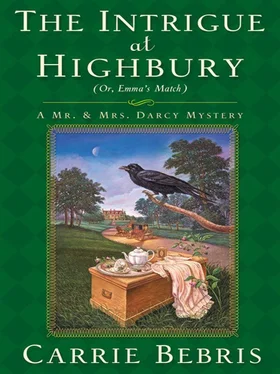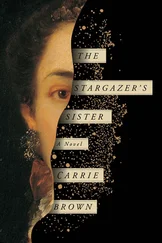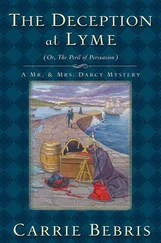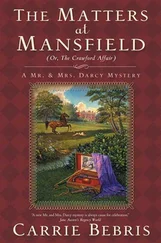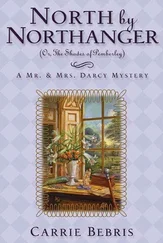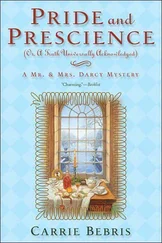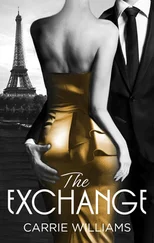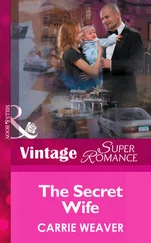Thomas Dixon appeared, his arms laden with parcels. “Where is Miss Bates? I come bearing new draperies! And her carpet will be delivered tomorrow.”
He paused, taking in the scene around him — most particularly the great brown stain on the rug. He stepped aside to avoid soiling his shoes. “Well! It seems I am just in time!”
“Oh! If you knew how much I love every thing that is decided and open!”
— Emma Woodhouse ,
Emma
Miss Jones took Hiram Deal’s place in the Guildford gaol pending trial. Had she read her own tea leaves before embarking on her murderous plan, she might have foreseen where it would end. Then again, given her competence as a fortune-teller, perhaps not. As it was, she managed to attain at least tolerable conditions for herself by plying her dubious soothsaying talents (supplemented by considerable theatrics) among her fellow prisoners, earning enough coppers to secure small comforts while she awaited the spring assizes.
Thomas Dixon, when questioned, admitted to having authored the raven riddle. Following Edgar Churchill’s death, he had thought perhaps the poison had been administered at the gypsy camp, but had not wanted to betray his own presence there for fear of implicating himself in the crime. The appearance of the first charade had inspired him with a means of aiding the investigation anonymously through a puzzle of his own, and it was an easy matter to leave the letter on the post office counter as the aged postmaster snored in his chair. As for the secret to which Miss Jones had alluded, no one ever asked him about it, and he never told.
Eventually, as his fortune had predicted, Mr. Dixon indeed came into money as a result of a death — just not that of a Churchill. Years after the Highbury intrigue was resolved, his friend Ridley passed out of this life while defending his honor in a duel. A lifelong bachelor estranged from his relations, the gentleman bequeathed his fortune and London townhouse to Thomas Dixon. Mr. Dixon assuaged his grief and memorialized his friend by immediately embarking on a comprehensive redecorating scheme. He was last seen engaged in a spirited debate with his favorite upholsterer over the virtues of paisleys versus stripes.
Hiram Deal was proved to indeed be the son of Edgar and Agnes Churchill. The discovery of the nurse who had attended his birth, combined with the testimony of a superannuated servant, corroborated his story, and the court officially recognized him as Edgar Churchill’s legal heir. The events in Highbury having left him feeling his age and weary of wandering, Mr. Deal exchanged his itinerant lifestyle for a more settled existence. His years amongst the gypsies, however, forever influenced his perspective. He rejected the considerable estate of Enscombe and the responsibility — and values — it represented. He signed over his inheritance to his cousin, Frank, reserving for himself only enough money to open a respectable shop and live a comfortable existence with his new wife: a woman of maturity, of gentle, even temperament, of cheerful disposition, and of open heart.
Miss Henrietta Bates became Mrs. Hiram Deal in a simple ceremony performed by Mr. Elton in the village church. Mrs. Elton pronounced the wedding entirely devoid of elegance or fashion, citing in particular the insufficient quantities of lace and beadwork adorning the bride’s dress. Her opinion of the new Mrs. Deal’s exotic mother-in-law, who attended the nuptials in full drabarni regalia, she dared not utter for fear of attracting unfavorable attention from Madam Zsófia.
The rest of Highbury, however, rejoiced that the spinster whose prospects had so long appeared hopeless (particularly to the Eltons) made so happy a marriage, one of affection, esteem, and companionship. Mrs. Deal, at last sharing her life and home with someone who both heard and responded to her, was no longer dependent solely upon the sound of her own voice to fill the silence, and gradually came to better govern her own discourse. Mr. Deal, in turn, at last enjoyed the felicity and contentment of ending each day in comfortable conversation with an intimate audience before his own hearth. Both considered themselves to have come into wealth — true wealth — beyond any they expected to know in this life.
The newlyweds took up residence in a larger house, appointed in a discordant combination of plain English style and eclectic foreign embellishments that would have given Thomas Dixon seizures had he known. Frank and Jane Churchill were delighted to see both Bates ladies established in the new home, which included old Mrs. Bates’s familiar chair by the fire and a room for her that no longer required the elderly lady to hazard a dark, narrow stair. What Mrs. Bates thought of her new son’s history was anybody’s guess, but she welcomed him into her family with warmth, and the expressions on her countenance as she attended the conversations between him and her daughter on winter evenings led one to believe that she actually heard them.
Emma, who had first introduced Mr. Deal to Miss Bates — as peddler to customer — took credit for the match. Or at least, consolation in the fact that Mrs. Elton’s matchmaking efforts did not succeed. Once Mr. Deal’s legitimacy was confirmed and it became known that he was a Churchill, she deemed the union suitable. She took greater pleasure in her new friendship with the Darcys, a pleasure shared by her husband, who at last had a peer with whom he could discuss agricultural issues to his heart’s content. Upon parting, the two gentlemen made plans to meet again in London, and to include Lord Chatfield among the party.
Mr. Woodhouse bemoaned the departure of “poor Mrs. Darcy” from Hartfield. He exhorted her to dress very warmly for the journey to Brierwood, and made her promise never to eat bisque. He also hinted that when she arrived at the home of Colonel and Anne Fitzwilliam, she should look inside her trunk for one final mysterious message.
Elizabeth smiled when she found it. Though penned in the less-than-steady hand of Mr. Woodhouse himself, it was easily deciphered.
Serle’s recipe for gruel.
In general, it was a very well approved match. Some might think him, and others might think her, the most in luck.
—
Emma
Darcy and Elizabeth enjoyed a happy Yuletide with their daughter and Georgiana at Brierwood, and continued on for several weeks afterward with Colonel and Anne Fitzwilliam. Yet their unanticipated adventure in Highbury made them anxious to return home to the serenity of Pemberley, and so, not long after Twelfth Night passed, they journeyed northward. As their coach entered Derbyshire, Elizabeth welcomed the familiar landscape.
“Will you be ready to travel south again in the spring?”
Darcy, she knew, had been quietly observing her — inasmuch as there was anything quiet about the inside of their carriage on this trip. Lily-Anne, just learning to walk, was impatient with the confinement of recent days.
She shifted Lily-Anne to her other knee, wrapped her arms around her, and rested her chin on her daughter’s head. A smile spread across her face. “Indeed, yes.” She had promised Anne to return for her lying-in. Georgiana would accompany her. On that visit, Elizabeth would bring with her another family heirloom that had once belonged to Darcy’s mother.
“I was thinking that perhaps after Anne’s confinement, you might join us, and we could all take a summer holiday,” Elizabeth said. “Mrs. Knightley told me that she and her husband went to the seaside for their wedding-trip, and she highly recommended it. I have never been to the sea, but I would like very much to see it.”
Читать дальше
